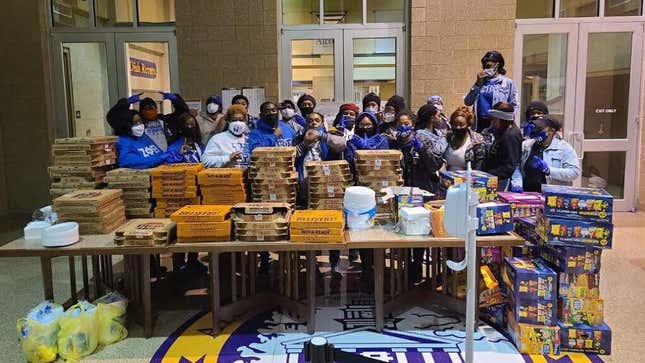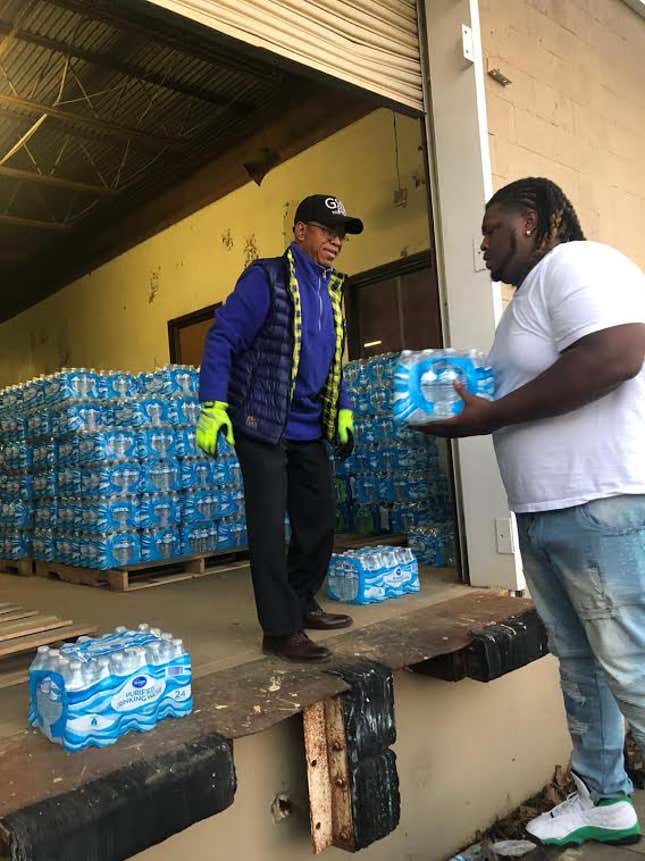
Many residents in Jackson, Miss., are closing out their third week without clean water after record-breaking freezing temperatures froze plant equipment and burst much of the city’s water pipe systems in the state’s largest city.
Activists on the ground are frantically running around Jackson and the nearby Delta area to ensure that residents have access to clean drinking water, food and other essential items. The city of Jackson and the surrounding areas are under a boil water advisory as local issues work to repair the water piping system residents say have been in dire need of repair for decades.
“People weren’t prepared for it,” Rukia Lumumba, co-founder and executive director People’s Advocacy Institute, told The Root. “Our infrastructure wasn’t prepared for it. But then there’s this coupled with the fact that the state has not responded. It didn’t respond to our needs to the crisis, so people in rural communities are still without water to some extent. Then the people in Jackson are still without water and the state has failed in any regard to actually just say, ‘Let us provide some subsistence to help fix these pipes, which we know is a huge problem that the state was responsible for for years, and didn’t do it in the first place.’ Every year, Jackson has asked for assistance in fixing our billion-dollar water infrastructure problem that pre-existed any black leadership.”
Mississippi Gov. Tate Reeves’ office did not respond to The Root’s request for comment.
Mississippi Today reports an estimated 40,000 people are still without running water and that local officials aren’t sure when water service will be restored. Some 80 water-main breaks and leaks have been reported across Jackson and the city remains under a boil water alert. Many of the pipes are over 100 years old. Race is playing a role in who is facing the brunt of the crisis.

Most of the city’s white residents live in northeast Jackson, where most of the upgrades have taken place. Also, per Mississippi Today, their proximity to water treatment plants protect them from long-term outages. However, the majority-Black areas of the city, like south and west Jackson, are experiencing most of the issues.
Jackson Mayor Chokwe Antar Lumumba, who is the brother of Rukia, asked state and federal officials this week for an emergency appropriation of $47 million to make necessary repairs to solve this current crisis; it is estimated that it will cost more than $2 billion to solve the water and sewage issue in Jackson, more than six times the city’s budget.
Rukia said there is a massive grassroots effort to get water to folks and the city is helping as best it can, but locals are still enduring challenges. Folks could not get to work because the roads were unsafe and many have lost income that would have allowed them to buy groceries and other essentials. She added that the effects of the water freeze revealed the small things that people take for granted when your infrastructure fails.
“I am helping to distribute water, so I can at least get access to it,” Rukia said. “The other day I was actually looking at my own water supply and I was like, ‘Oh, well dang. I only have one case left.’ I’ve been working so much that I forgot to even think about my household. But I definitely was out of water for a very short period of time. I was one of the lucky ones where the water was out for three weeks. My water pressure isn’t back to its normal level. However, I can take a shower. I started to be able to take a shower last week. And you just...yeah. The privilege of that.”
Three hours down I-20, locals in mostly Black Shreveport, La., continue to struggle with the impact of the freezing temperatures from three weeks ago. The city lifted a water boil advisory, but some residents say their water is still not clean enough to drink and refuse to drink water from the tap. A small-business owner in Shreveport, Maurice Jefferson, said his healthcare and entertainment companies were already affected by the pandemic and that this water crisis had him volunteering much of his time passing out bottled water to his clients. Spring is usually when his businesses see an uptick, but he fears that many of his old clients will have to spend money on repairing pipes at their homes and paying off utility bills they’d otherwise spend on his services.
“This affects the economy all the way around the board because people who were greatly impacted had to spend money differently,” Jefferson said. Since there wasn’t any retroactive recoup through our local government, they had to question how they spend in the next couple of months as well to restock things, or went to replenish what they already had.”
He tried to apply for a Paycheck Protection Program (PPP) loan, federal money meant for small businesses to get through the pandemic, but he said he was not eligible because he has a felony. Also, one of his businesses started during the pandemic, which made him ineligible. He said he was furloughed from his job, but became an entrepreneur to take care of his family.
“It doesn’t really make any sense because if I rehabilitated myself in society, and I’m turning over a new leaf to be an entrepreneur, I should fall in the guidelines for that,” he said. If it’s to help the small business person, then why are we so excluded?”
In a statement to The Root, Shreveport Mayor Adrian Perkins said the city has been helping displaced citizens with relocation assistance and are also working to establish a fund to help eligible residents with emergency repairs due to the storm; it will be targeted at seniors. There are also plans for a separate program to assist individuals with their water bills.
As The Root previously reported, many Shreveport residents say they are still seeing discoloration in their tap water after the water boil ban was lifted. The Water Department, per the mayor’s office, said it has only received three complaints of dirty water and four complaints of cloudy water.
If locals in Shreveport are having water issues, they are advised to call 673-7651 or 673-7654.
Across the nation, be it in Flint, Mich., Newark, N.J., Denmark, S.C., much of Texas—which has gotten the lion’s share of media coverage—or hundreds of other communities, communities have endured poor infrastructure issues because city, local and federal officials have failed to invest money into aging systems that more often than not negatively impact Black and minority communities. In Washington, D.C., President Joe Biden is figuring out whether to propose a major stand-alone infrastructure plan or to make it a package deal, according to The New York Times. The challenge with these types of bills is that major corporations stand to gain huge sums of money in government contracts while local communities of color are too often left out of the job opportunities that come from them. Democrats and Republicans are terminally divided on spending, so it is likely that any infrastructure package that is to come will happen without Republican support and a tie-breaking vote from Vice President Kamala Harris.
A 2019 report found more than 2 million people in the U.S. and Puerto Rico don’t have access to running water and inside plumbing. In 2017, an analysis published by The Center for Public Integrity found that Black communities are disproportionately impacted by decaying water pipe systems.
Talking to activists in most of these affected communities, they say these issues pre-date Black leadership and that the problems grew worse when state leadership, which is usually mostly white and Republican, saw that most of the people imperiled were Black residents who are unlikely to vote for them.
C.J. Lawrence, a local activist in Jackson, said that lawmakers at the state level are leaving his city to manage the crisis on its own and there is a reason for that.
“You’ve got the water crisis going for the last three weeks because of the freeze,” Lawrence said. “Then you have that compounded by [Gov. Reeves] lifting a mask mandate as our numbers are finally starting to decrease. Some of the mayors are taking it upon themselves, of course, to continue enforcing their city mandates. But on a state level, this guy is doing everything in his power to compound it again. Jackson is the Blackest city in the state. It feels intentional, man. That’s what I’ll say.”

